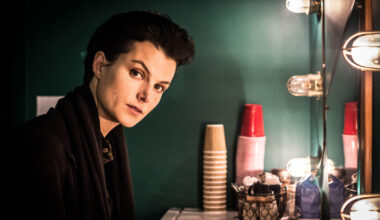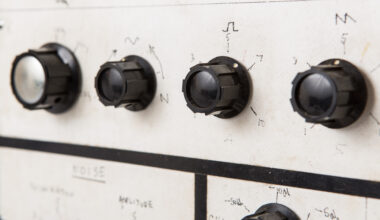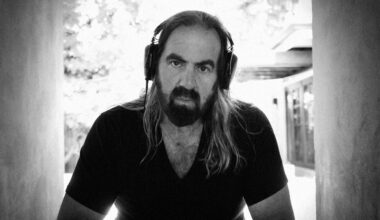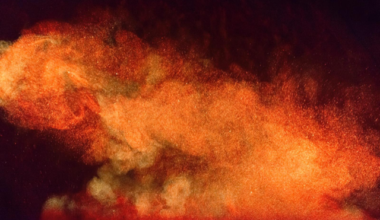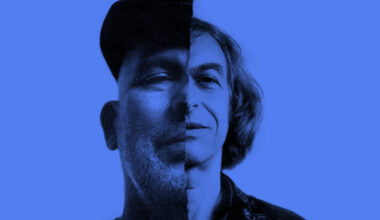Equal parts euphoria, beauty and tragedy, Fantastic Twins’ ‘Two Is Not A Number’ is an astonishing and ambitious concept album that explores the lives and trajectories of imaginary twins. Eerie, uneasy and swirling with atmospheric darkwave/synthpop hues, prepare to step into its enticingly dreamlike world
Let’s start at the end. Me and Julienne Dessagne (aka Fantastic Twins) are wrapping up our conversation about her new record ‘Two Is Not A Number’, and I’m asking the French producer if I’m wrong to pick up on something truly remarkable in its hugely moving closing track, ‘All Of This Is Resolved’.
I hear all the things – the dazzling sonic innovation, the hypnotic repetition and the wholly unique sense of compositional musical structure – that have made ‘Two Is Not A Number’ such a stunning record up to that point. But crucially, I also hear, if not redemption, then something approaching hope. And in 2023, that’s a rare groove indeed, especially when it’s not a self-help sentiment but something that’s arrived at through toughness, discipline and a ruthless concision. But there it is, undeniable. Hope. Glimmering through the murk and darkness.
“Hopeful because it’s a question mark,” says Dessagne. “I knew from the beginning when I made the track, that it was going to be the last track. When I was making it, I was thinking, ‘I gave myself this story with the twins, and it’s about their lives. I’ve been working around this twins concept for a while. I have this feeling that it is over now, and have I said everything? Are these twins dead? They are dead’.
“I was going through a whole existential thing myself about what I have to say as an artist. Does it end there? When I was singing these vocals, it was an extreme emotion, moments where I’m actually almost crying. And I kept those moments because there was this really essential question of, ‘Yeah, we’re gonna die’, you know? The lyrics, ‘Gonna take you home with me’ – for many people, home can be a different thing, but for me it’s taking you somewhere you can find peace and hope. I only found that through intense drama.”
I like the fact the lyrics manage to talk about polarities and complexities but without judgement, without having to have the final word.
“Exactly,” agrees Dessagne. “And without the incentive of, ‘This is where you should go, this is what you should do’. I had the feeling with ‘All Of This Is Resolved’ that I was coming home to something essential that I have, that’s incredibly hard to get out of myself. My trajectory throughout this record was… tormented.”
As a listener, your trajectory through ‘Two Is Not A Number’ (released on Dessagne’s new House Of Slessor label) will be emphatically one of delight, not torment. It’s one of this year’s most startling, deeply rewarding, yet instantly addictive transmissions.
The album chronicles a pair of imaginary twins from their birth, through life and to their death in a series of utterly enrapturing, danceable experiments in electronic sound. The conceptual basis of ‘Two Is Not A Number’ isn’t just a postoperative explanation of the piece. The twin idea – the idea of dualities, of multiplicities and how they contradict the false adversarial oppositions of our consciousness and lives – threads itself deep into what you hear and the words Dessagne sings and intones.
Born in Saint-Étienne, Dessagne was a contemporary ballet dancer for 20 years. Having studied political sciences at Sciences Po in France, she then undertook an additional master’s degree in European Cultural Policies at Glasgow University. It was here, at the Optimo Espacio nights every Sunday at Sub Club, that she had an epiphany, propelling her into electronic dance music.
The intriguing mix of theory and praxis that’s characterised all her solo and remix work up to now still feeds into the miraculous balance between the head and the body in the music she makes as Fantastic Twins. New tracks like ‘Land Of Pleasure Hi Fi’ are full of information for the head, but also information for the body, for the butt. They have that crucial electronic physicality that is simultaneous with the head-wrecking aspects.
“Oh, 100 per cent,” says Dessagne. “When I started making music, it quickly became clear I had this need of something charismatic in the tracks. There has to be something that catches my attention – in my ears and brain, but also physically. I think it goes back to Optimo, and my first experience of classical and contemporary music being through dancing at a very intensive level.
“I have this visceral bond to the music and something has to happen where I can’t control it with my mind. Your brain can go in so many directions, but with the body – and the feeling of sound as a weight in your body – this gives me reassurance. There has to be more than just an intellectual appreciation.”
2017’s ‘The New You’ EP and ‘Obakodomo’ album, as well as 2019’s incredible ‘Lost In Germany’ EP, all suggest that Fantastic Twins, in coming to electronic music from the unique perspective of contemporary avant-garde composition and dance, was a place in which Dessagne could fully explore her nonconformist ideas around sound. It’s the fluidity of that simultaneous brain/booty fix that in lots of ways erases your expectations of separation and hierarchy throughout ‘Two Is Not A Number’.

What you hear on the likes of the remarkable ‘Sisters At Odds’ is an immediate unconventionality of structure, but also a dissidence to sonic hierarchy. It’s as if everything is moveable, and rather than tiers of sound which settle into conventional places, the music is composed of layers that shift tectonically over each other, playing with the assumptions of the listener. It’s truly electrifying.
“When I perform, I only play live – I don’t play DJ sets, and what you’re talking about stems from actually not really knowing what the structure of a track should be,” grins Dessagne. “A DJ is attentive to what ‘should’ be happening. I don’t have that. Live, I might compromise a little more on giving people what they expect but when producing in the studio, I really don’t care. There is a narrative to the LP but within each track I don’t need that narrative being over-weighted – I need flow…”
You need tracks to get to this kind of poised, mesmeric space where they can just hang?
“Yeah, exactly. There’s a lot of reward for the listener in realising that the moment they expected didn’t happen where they felt it should have happened. There’s a flow – and it’s not always obvious.”
‘Two Is Not A Number’ was created during the long period of enforced isolation and lockdown in the pandemic. Dessagne uses scrapbooks of artwork, images, photography and quotes in her research towards new creative ideas, and absorbs late-night YouTube rabbit-holes into her process. 2016’s mind-frazzling ‘Bight Of The Twin’ documentary – in which Genesis P-Orridge and filmmaker Hazel Hill McCarthy journey to Ouidah in Benin to explore the origins of the Vodoun religion – was particularly inspirational to ‘Two Is Not A Number’.
“The book where I collect this stuff goes in every direction,” explains Dessagne. “From something I saw on my plate in a restaurant, to the streets, to the museum. During the period when I was making this record, I was very depressed, feeling it was not moving forward quickly enough. Then I dived into the depths of YouTube and found that hugely over-dramatic documentary that made me laugh. But I came back in the studio the next day with the sense of intense tragedy that really helped me to create music.”
Although she’s making music that hits you with the immediacy of great pop, Dessagne never approaches music from a pop perspective – and the loose structures, the refusal to slip into the usual verse-chorus schematic puts every element in a thrilling, free-wheeling place. Particularly fascinating is how vocals fit into her music – the habits of pop, and perhaps our habit as listeners, is to foreground voices, to see them somehow as something pure, held up by the music.
But in Fantastic Twins, voices are another malleable instrument that can offer both tenderness and coldness. Dessagne breaks her voice into shards, scattering it carefully amid the other elements to contribute rhythmically to the groove, but also to the melodic detail – a production style that enables her to step between personas, to evanesce her ego. I’ve not heard vocals like it anywhere else this year.
“I’m not a vocalist,” stresses Dessagne. “And I found with this record that the more words I wrote, the more that universality and impact became lost. I also really got to know my own voice. I used to add loads of operatic effects to my voice using a preset and I was always terrified that, ‘If this machine breaks, what happens?’.
“So, before it broke, I put it away and started exploring all the things I can sonically do with my voice – the layers I can create, the sense of depth, the intensity. I need to feel that my voice is coming from deep down – underneath the ocean, from the sky or something very upfront. I try to give these vocals the exact treatment they should have to create these kinds of mental effects.”
“Mental effects” is exactly it. There’s a deeply lysergic, almost scary feel to this music that completely immerses you every step of the way because you never feel pushed or bullied by an ego. Dessagne’s work isn’t remotely a process of traditional artistic indulgence but an endless and deeply emotional tightrope walk between sonic playfulness and conceptual discipline.
So how does Julienne Dessagne know when a Fantastic Twins track is done? Does she need a deadline to work?
“I find it extremely difficult to decide when it’s finished,” she sighs. “You get nervous. You need outside ears. It was heartbreaking to consider it finished because I really enjoyed the phase of researching and composing, when you’re taking a risk and you don’t know where you’re going. That’s a very comfortable bubble for me as a producer, this time of creating when I don’t have to share it with the world. It connects with the feel of twins in the womb, and that combination of trauma and comfort is linked with both creating and letting your creation be heard out in the world.
“I don’t really decide when it’s finished – the track decides. When I make a soundtrack or a remix, there’s a clear remit and constant collaboration – but this record was a blank page and down to me. There are days when nothing happens. Then there’s that day where you feel an emotion, and you feel you’re touching something that is worth keeping or exploring.”
During the making of ‘Two Is Not A Number’, was Dessagne thinking about how in hell she was going to be able to play it live?
“No,” she replies. “Live, I tend to strip things down and simplify a lot, getting rid of subtleties. When I made the record, I imagined people listening with headphones, hearing so many more details than when you are in a room full of others and you just want to dance.
“This is an old-school record, in that you listen on a personal and intimate level, but live I have to give myself some freedom. Every time I try to create something I can reproduce live, it loses spontaneity and intensity. I think this is always somehow consciously in the back of my mind when I make music in the studio, but on this record I freed myself from that idea.”
The pull between creative freedom and creative anxiety is what characterises ‘Two Is Not A Number’ and makes it an astonishingly apposite album. It takes all the binaries we’ve been tutored in throughout our whole lives – others and ourselves, creation and destruction, life and death – and suggests a complexity of mutual dependence and simultaneity that’s absolutely mind-blowing.
Let ‘Two Is Not A Number’ under your skin. Without judgement. Without a final word. It won’t leave.
‘Two Is Not A Number’ is out on House Of Slessor


